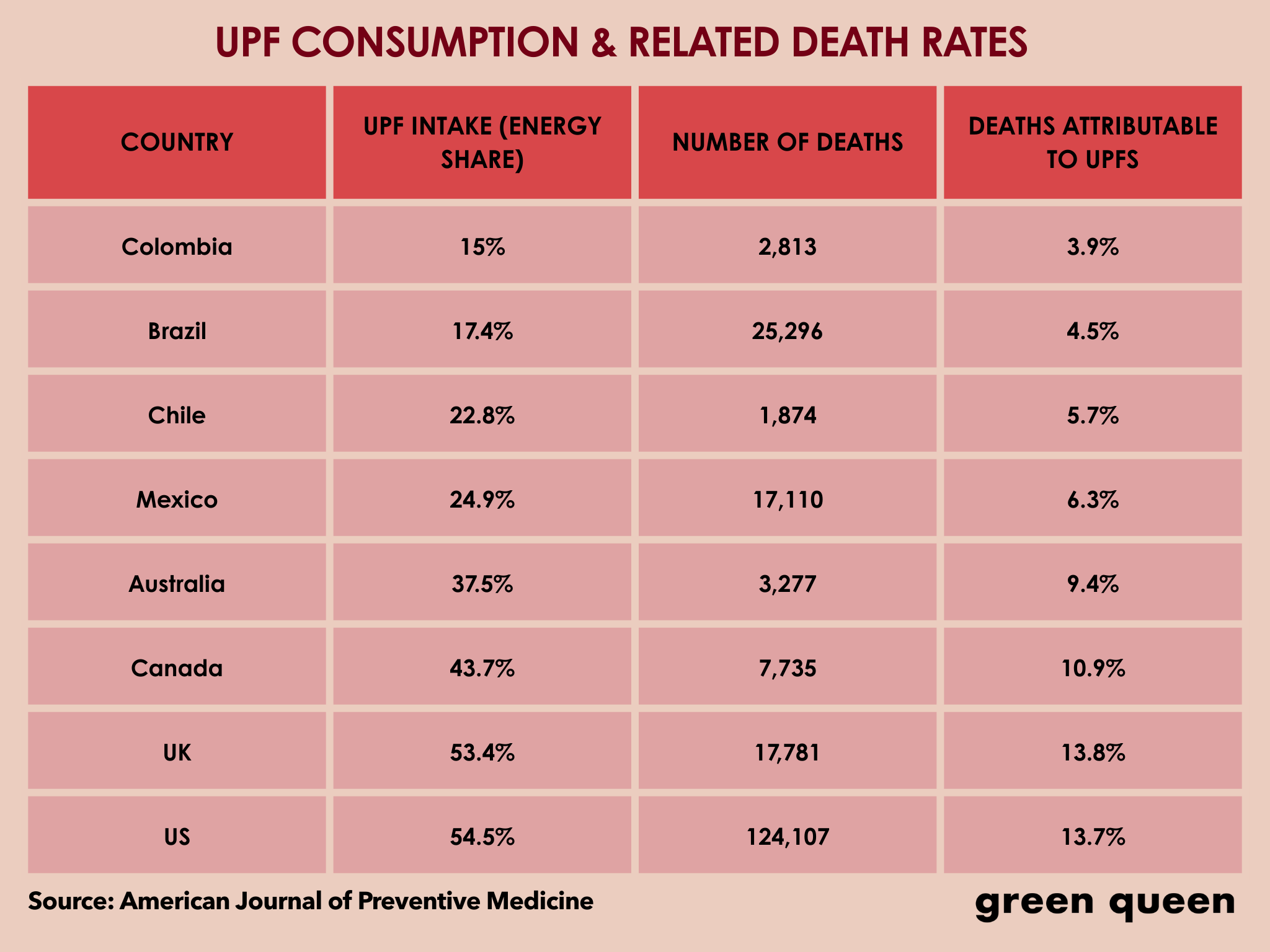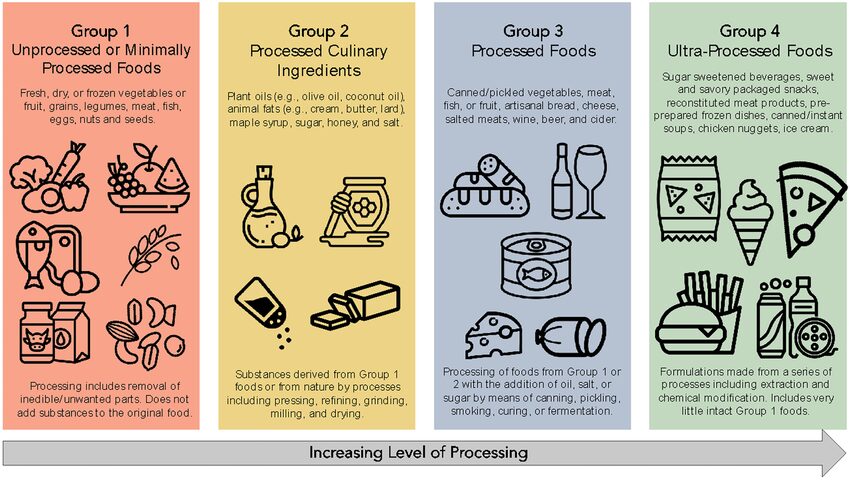
In an international study, experts suggest that ultra-processed foods and the “artificial” additives in them can raise the risk of premature death.
Between 4-14% of premature deaths in eight countries are attributed to the consumption of ultra-processed foods (UPFs), according to a new global study.
Published in the American Journal of Preventive Medicine, researchers from Latin America suggest that each 10% increase in UPF intake raises the risk of death before reaching 70 by 3%.
It’s not just the high amount of salt, sugar or fat that makes UPFs a threat, according to the study, it’s also the use of emulsifiers, artificial flavourings, and other additives, a finding that throws cold water on arguments that processing isn’t directly connected to health.
“UPFs affect health beyond the individual impact of high content of critical nutrients (sodium, trans fats, and sugar) because of the changes in the foods during industrial processing and the use of artificial ingredients, including colourants, artificial flavours and sweeteners, emulsifiers, and many other additives and processing aids,” explained lead investigator Eduardo Augusto Fernandes Nilson, from the Oswaldo Cruz Foundation in Brazil.
Death rates are highest in countries with heightened UPF consumption

UPFs represent the bottom (read: least healthy) rung of the Nova classification, developed by a team of scientists in Brazil in 2009. The research was led by Dr Carlos Monteiro, who is a co-author of this new study.
According to the Nova classification, UPFs are produced via industrial formulations and techniques like extrusion or pre-frying, combined with cosmetic additives and substances of little culinary use, such as high-fructose corn syrup, hydrogenated oils or modified starch. This includes products like ice creams, sugary cereals, fizzy drinks, ready-to-eat meals, processed meats, and in some cases, plant-based meat alternatives.
Previous studies have focused on specific dietary risk factors instead of food patterns; this latest research modelled data from nationally representative dietary surveys and mortality data from eight countries – Australia, Brazil, Canada, Chile, Colombia, Mexico, the UK, and the US – to link dietary patterns and the extend of industrial food processing to death from all causes.
The authors found that death rates are highest in countries where the population gets the largest percentage of energy calories from UPFs. In the US, 60% of all calories come from UPFs, and according to this study, more than 124,000 early deaths in 2018 – or 13.7% of the total – were “attributable to UPF consumption”.
Similarly, in the UK, where they make up 57% of calorie consumption, if no UPFs had been consumed, it would have prevented over 17,700 of all deaths (13.8% of the total) in 2019.
The death rates were lower in countries like Colombia (4%), Brazil (5%), and Chile (6%). “It is concerning that, while in high-income countries UPF consumption is already high but relatively stable for over a decade, in low- and middle-income countries, the consumption has continuously increased, meaning that while the attributable burden in high-income countries is currently higher, it is growing in the other countries,” said Nilson.
Experts question findings, but conclude UPFs ‘unlikely to be healthful’

Previous research has linked UPFs to 32 harmful health conditions, including cancer, heart disease, type 2 diabetes, poor mental health, and early death. However, many nutrition experts have called into question the use of the Nova classification to determine health outcomes.
“Products like breads and cereals often contain higher amounts of fibre, which, according to the Nova system, wouldn’t technically classify as UPFs,” Jenny Chapman, a Churchill Fellow who authored a study about plant-based meat and UPFs, told Green Queen last year. “It’s crucial to recognise the limitations of the Nova system, which does not account for nutritional content, leading to potential misclassification.”
Responding to the current study, Nerys Astbury, a nutrition scientist and an associate professor of diet and obesity at the University of Oxford, noted that the research “does not mean that these deaths were caused by UPF consumption”. “The methods of this study simply cannot determine this,” he said.
“There are limitations to this paper, including the points the authors themselves raised,” added Nita Forouhi, a professor of population health and nutrition at the University of Cambridge, who was not involved in the study either. “Nonetheless, evidence on the health harms of UPFs [is] accumulating, and this paper does add to that body of evidence, and UPFs are unlikely to be healthful.”
The authors call for a reduction of UPFs to be included in national dietary guidelines and addressed in public health policies. “Policies that disincentivise the consumption of UPFs are urgently needed globally, promoting traditional dietary patterns based on local fresh and minimally processed foods,” said Nilson.
For his part, Astbury said “rushing to add recommendations on UPFs” wasn’t necessary. “Many national dietary guidelines and recommendations already advise the reduction of consumption of energy-dense high-fat high-sugar foods, which typically fall into the UPF group,” he explained.
“Adding additional recommendations based on UPFs could cause consumer confusion – some foods may be considered unhealthy by nutrient standards, but not so by Nova classification (and vice versa),” he added.
UPF backlash changing the plant-based food landscape

“The Nova system, which defines foods according to different levels of food processing, has many limitations, including arbitrary definitions and overly broad food categories, the over-emphasis of food ingredients [as] opposed to the processing per se, and the difficult practical application of the system in accurately classifying foods,” said Astbury.
Nevertheless, the study is another blow to products like plant-based meat analogues, which have come under fire for their processing methods and use of emulsifiers and additives. On top of that, US health secretary Robert F Kennedy Jr has been highly vocal against UPFs, and has previously suggested that “fake meat is just another name for ultra-processed food”.
Concerns around UPFs have led to a slowdown in purchases of plant-based meat in certain markets – in the US, these products suffered a 5% decline in sales last year. Meanwhile, traditional plant proteins like tofu and tempeh enjoyed a 7% rise, while whole-food-focused brands such as Actual Veggies doubled revenues.
In the UK, this has resulted in the emergence of new plant protein formats like Oh So Wholesome’s Veg’chop and THIS’s Super Superfood.
The post New Global Study Shows Additives in Ultra-Processed Food Can Increase Risk of Early Death appeared first on Green Queen.
This post was originally published on Green Queen.